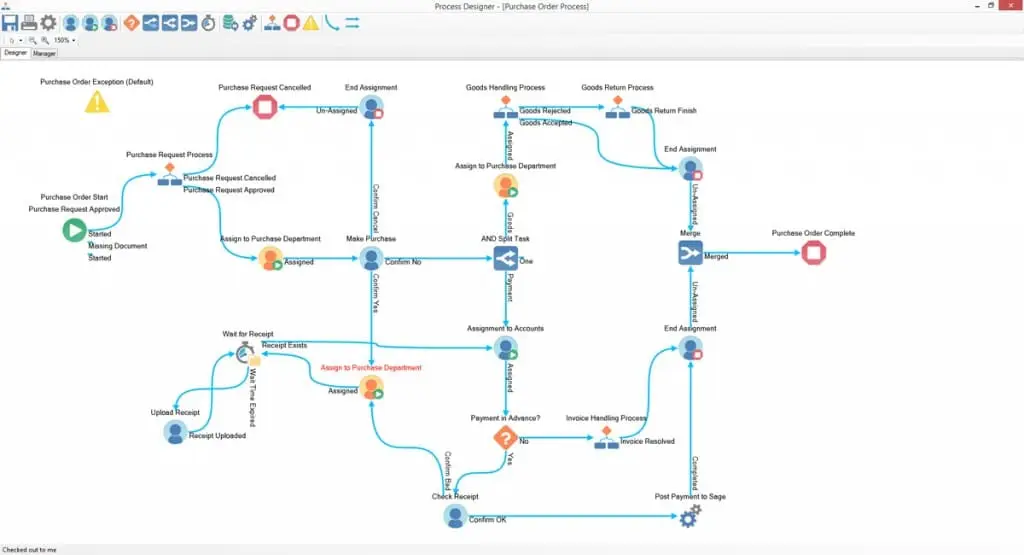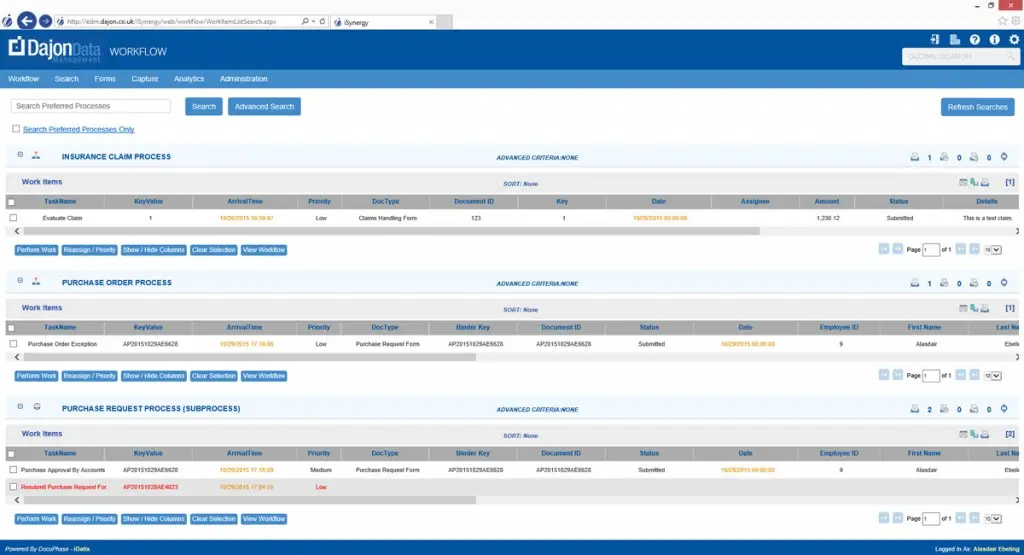Bespoke insurance and claims process automation
Managing all the paperwork which comes with an insurance business can be a labour-intensive task. From handling quotes and no-claims discounts to processing claims and renewals, efficient and organised systems and processes can make all the difference.
With the right software, you can handle your paperwork with ease with everything instantly available at the click of a button. Our smart routing technology enables each member of your team to get more done in less time. All of which means you can serve your customers better.
Insurance Process Automation
Automate repetitive processes like renewals, claims, and underwriting. Share information with ease across your organisation. Centralising data with intelligent processes which are designed around your business will make your job more rewarding and improve customer experience. All of this and more is possible with Dajon’s digital transformation for the insurance sector.
A key part of this change is automated workflows which make life simpler for your staff and give them access to the relevant documents they need to process paperwork. Workflows like claims and insurance automations allow you to determine how you want work to be done and by whom. This is especially useful during peak business seasons and end-of-year reviews.

Your Business, Your Rules
No one understands your business as well as you do. That’s why our software can be tailored to your specific requirements. You say how you want the work done, we build the process together using our simple drag-and-drop workflow editor.
You control your processes and your data and can ensure tasks are routed to the right person at the right time.

Insurance Automation
Documents can be scanned automatically or easily set up as online forms without the need for endless data entry.
Manage your work automatically, our software will route work to the right person at the right time. If one person has too much work, it can be rerouted as required.
Data entry errors and missing documents will be a thing of the past leaving your team to focus on what they do best.

Intuitive Work Queue
Smart organisations have full visibility of their workflows and can manage issues before they arise.
Seeing where bottlenecks occur can show where there are training needs or additional resources required, this can be especially valuable during peak seasons or holidays where managers can easily redeploy people to critical tasks.

Frequently Asked Questions
- What is insurance digital transformation?Insurance digital transformation refers to the process of leveraging digital technologies to modernize and optimize various aspects of the insurance business. This encompasses a wide range of initiatives, including digitizing paperwork, enhancing customer experiences through online portals and mobile apps, implementing data analytics for risk assessment, and automating backend processes such as claims processing and underwriting.
- How is technology changing insurance?Technology is revolutionizing the insurance industry in several ways. Firstly, advancements in artificial intelligence (AI), machine learning, and data analytics enable insurers to analyse vast amounts of data to assess risks more accurately, personalize policies, and detect fraudulent activities. Secondly, digital platforms and mobile apps empower customers to interact with insurers conveniently, from purchasing policies to filing claims and accessing support services. Additionally, blockchain technology holds promise for enhancing transparency, security, and efficiency in areas such as claims management and policy issuance.
- What is claims automation?Claims automation involves using technology to streamline and expedite the claims processing workflow. This includes automating data capture from claim forms, leveraging AI algorithms to assess claim validity and estimate payouts, and integrating with third-party data sources for fraud detection and risk assessment. By automating routine tasks and decision-making processes, claims automation reduces processing times, enhances accuracy, and improves overall customer satisfaction.
- What is insurance automation?Insurance automation encompasses a broader spectrum of automated processes within the insurance industry, beyond just claims processing. This includes automating underwriting decisions, policy administration, billing and invoicing, customer communications, and regulatory compliance. By automating these repetitive and time-consuming tasks, insurers can increase operational efficiency, reduce costs, and allocate resources more strategically.
- Is claims automation the future of insurance?Claims automation is indeed poised to play a significant role in the future of insurance. As customer expectations for seamless digital experiences continue to rise, insurers must adapt by embracing automation technologies to streamline claims processing and enhance service quality. By automating routine tasks and leveraging AI-driven analytics, insurers can expedite claims resolution, improve accuracy, and free up resources to focus on more complex and value-added activities. However, while claims automation offers tremendous benefits, human expertise and judgment remain indispensable, especially in handling exceptional cases and providing personalized customer support.
- How to automate the underwriting process?Automating the underwriting process involves leveraging technology to assess risks, evaluate applicants, and determine policy terms and pricing. Here’s how insurers can automate the underwriting process effectively:
- Utilize predictive analytics and machine learning algorithms to analyze historical data and identify patterns that correlate with risk factors.
- Implement digital underwriting platforms that allow applicants to input information online and receive instant quotes based on predefined criteria.
- Integrate with external data sources, such as credit bureaus, medical databases, and property databases, to gather additional information for risk assessment.
- Leverage AI-driven decision engines to automate underwriting decisions for standard cases, while providing underwriters with tools for reviewing and adjudicating complex cases.
- Continuously monitor and refine underwriting models based on feedback loops and real-time data, ensuring ongoing optimization and accuracy.